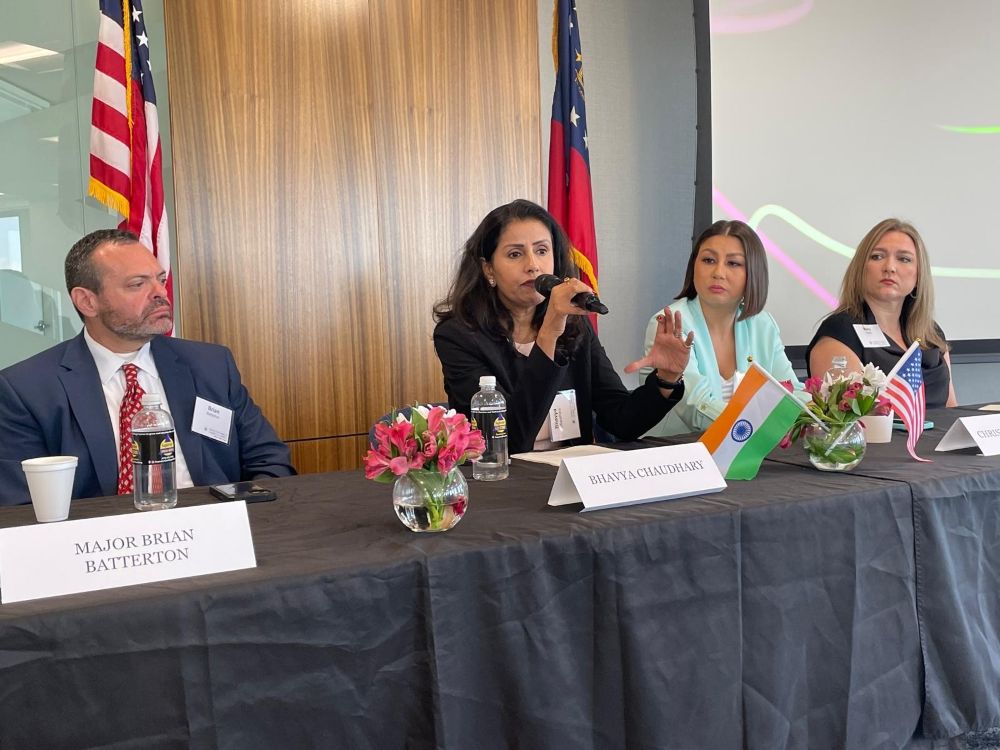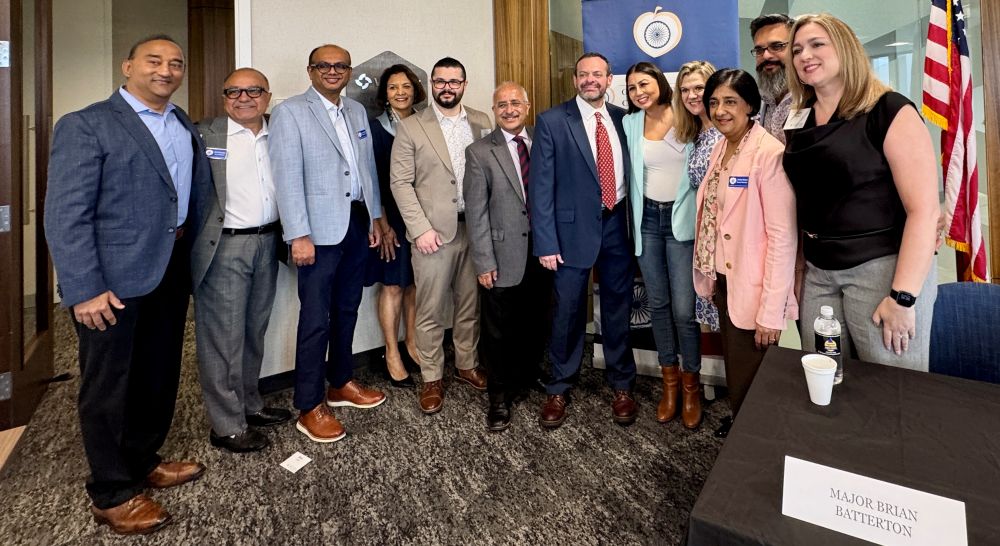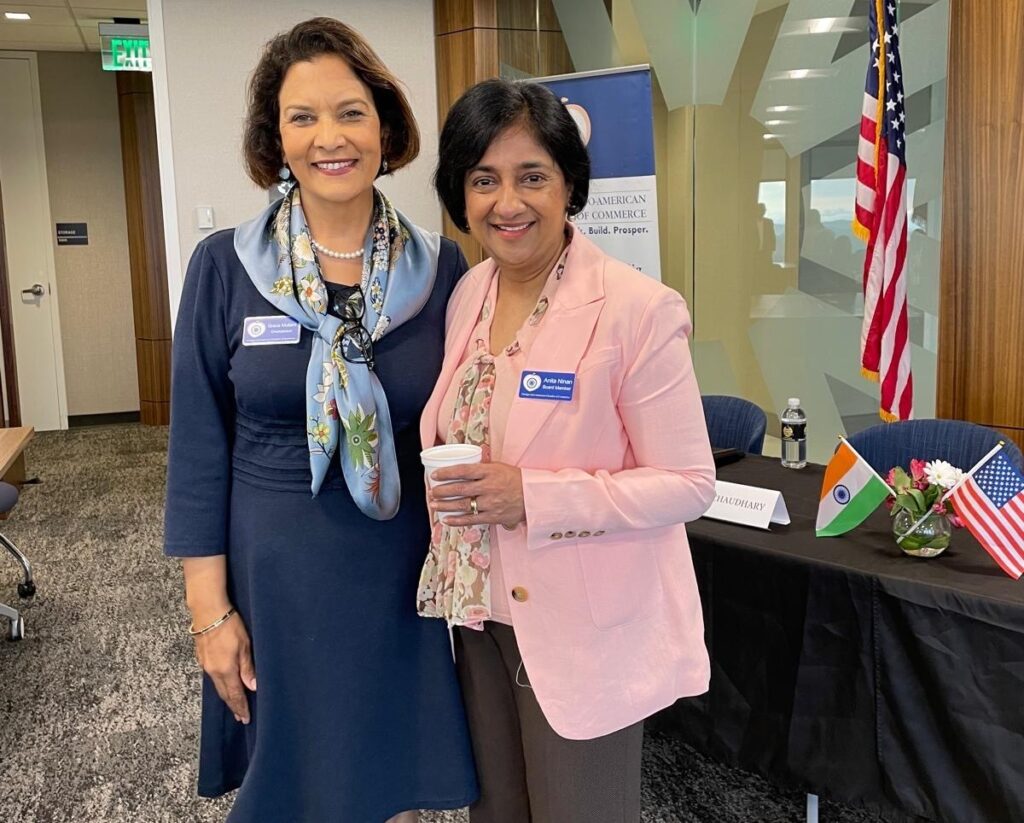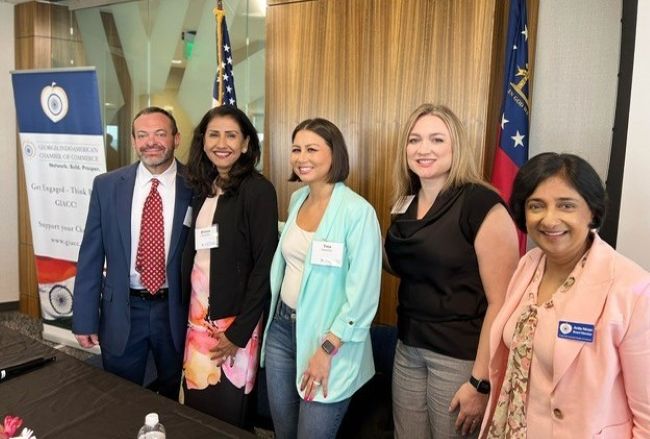Cobb County, GA, May 21, 2025: As the U.S. immigration landscape undergoes rapid transformation, the challenges for foreign nationals, employers, and local enforcement agencies are becoming increasingly complex. These evolving dynamics were at the forefront of the event, US Immigration: Impact on You & Your Business held on May 14, 2025, at the Cobb Chamber. Hosted by the Georgia Indo-American Chamber of Commerce (GIACC), the event brought together legal experts, human resources leaders, and law enforcement officials to share insights and strategies for navigating today’s immigration system.
The panel moderated by Anita Ninan, Founder & Principal Attorney, Ninan Legal LLC, included Mary Helton, Chief Human Resources Officer at A.G. Rhodes; Tina Hamilton, Program Director for J-1 Visa Exchanges; Bhavya Chaudhary, Founding Attorney of Bhavya Chaudhary & Associates; and Major Brian Batterton, Precinct 4 Commander, Cobb County Police.

Executive Orders and a Shifting Legal Framework
Ninan opened the session by addressing the dramatic policy changes enacted under the second Trump administration. “We’ve seen over 147 executive orders,” she noted, “impacting non-immigrants, green card holders, and even U.S. citizens.” Ninan emphasized the forum’s mission to educate and empower attendees—including employers, families, and visa holders—through an action-oriented discussion.
The Employer’s Challenge: Immigration and Workforce Stability
Helton stressed the essential role immigrants play in addressing labor shortages, especially in healthcare. “Over 40% of our workforce was born outside the U.S.,” she said. “With an aging population and a shrinking labor force, immigration is key to our survival.”
But current conditions make planning difficult. “We’re discouraging international travel unless absolutely necessary,” Helton added. “Employees are fearful of not being able to return due to delays or policy shifts.” She advised meticulous preparation—booking visa appointments early, carrying printed documentation, and avoiding unnecessary scrutiny at ports of entry.
Legal Hurdles: Delays, Enforcement, and Compliance
Chaudhary highlighted the mounting delays in family-based immigration. “An I-130 petition for a spouse by a green card holder can now take over 55 months,” she said. Even green card renewals may take over a year, depending on geography.
Chaudhary also addressed the reactivation of alien registration laws. “Anyone without lawful status or an inspected entry must register through USCIS online Form 325 R,” she said, warning that noncompliance could result in steep fines, jail time, or immigration consequences.
Hamilton described hurdles in the cultural exchange space. “The Department of State is prioritizing STEM, law, and public administration over hospitality and service fields,” she said. Processing times for J-1 visas now range from 60 days to eight months, and consular delays abroad—especially in India—continue to disrupt travel.
She also cautioned that even visa holders with proper documentation face risk at the border. “CBP officers have broad authority and can deny entry. We tell participants: it’s still safe to travel, but be ready for questions.”
Ninan reiterated this, reminding the audience that legal counsel is not guaranteed at ports of entry and that derogatory information, including criminal history or social media activity, could lead to removal proceedings. “Expunging your criminal record doesn’t erase it for immigration purposes,” she warned.

Corporate and Law Enforcement Perspectives on Compliance
From a corporate compliance standpoint, Ninan noted an increase in federal audits and site visits, particularly targeting H-1B and L-1 visa employers. “The H-1B program is a strict liability program,” she said. “Any deviation—job duties, location, wages—can lead to penalties.”
Helton detailed how A.G. Rhodes manages these risks: by tracking visa expirations, training staff, and ensuring documentation is properly maintained. “We’ve trained our team on what to do if USCIS visits. You don’t just hand over documents—ask for ID and notify the compliance officer.”
Major Batterton clarified the role of local law enforcement under Georgia’s House Bill 1105. “Local police are not federal immigration agents,” he stated. “We don’t check immigration status during routine interactions unless there is a serious criminal issue.” He emphasized that crime victims and witnesses should not fear reporting incidents due to their immigration status.
Rising Risks for Students and Exchange Visitors
Both Chaudhary and Hamilton shared troubling developments in student and exchange visa enforcement. “We’ve seen SEVP terminate SEVIS records without notifying schools,” said Chaudhary. “In some cases, we’ve had to file lawsuits to challenge these terminations.”
Hamilton confirmed that exchange visitors have faced visa revocations for relatively minor incidents. “As sponsors, we are bound to enforce federal rules. But the lack of communication from SEVP is making it difficult to manage these cases,” she said. “We’re not just administrators—we’re guardians of public diplomacy. These participants represent their home countries.”

A Call for Awareness, Preparedness, and Policy Engagement
During the open Q&A session, attendees shared real-world concerns, underscoring how deeply immigration policies affect daily life—in the workplace, at the airport, and at home.
In today’s uncertain immigration climate, the Cobb Chamber forum served as both a wake-up call and a roadmap. As Ninan put it, “Stay informed, stay ready, and don’t go it alone.”
One of the central concerns raised was the disconnect between the political rhetoric surrounding foreign investment and the immigration realities on the ground. “We keep hearing about billions of dollars being invested—especially in battery plants or tech infrastructure,” said one panelist. “But bringing the actual people needed to build and manage these projects is where we hit a wall.”
Foreign companies moving into the Southeastern U.S., such as German firms establishing operations in South Carolina, often want to relocate key workers from abroad. That, in turn, triggers visa applications not just for one company, but for an entire supply chain of subcontractors and vendors. But even with solid business cases, visa petitions can be staggeringly burdensome. “We had to submit over a thousand pages just to prove one person’s L-1 qualifications,” said an immigration attorney on the panel, referencing a work visa for a senior manager.
The conversation also tackled how immigration enforcement intersects with local policing. Cobb County Police Precinct Commander, Major Brian Batterton clarified that his officers do not actively check immigration status during routine traffic stops. “That’s not something we’re trained to do, nor is it typically within our authority,” he explained. However, if a person lacks valid identification or is suspected to be undocumented, officers may contact Immigration and Customs Enforcement (ICE) for guidance. Still, transporting individuals solely for suspected immigration violations is not permitted under state law unless federal law specifically requires it.
“We assist ICE when we have the bandwidth, but it’s not our primary role,” said Batterton, highlighting the strain such cooperation can place on already limited law enforcement resources.
Questions from the audience touched on Georgia’s legal stance toward sanctuary policies. The panel noted that Georgia law explicitly prohibits sanctuary cities, and recent legislation (SB1105) even criminalizes officials who attempt to enact them. The panelists emphasized, however, that no state-run program exists in Georgia akin to Texas’ migrant relocation buses to New York or other states.
From there, the discussion turned to border entry practices. One audience member asked about migrants arriving via the U.S. Virgin Islands or Puerto Rico. The response was straightforward: “They are still subject to U.S. immigration processing. They may enter through those territories, but they don’t bypass immigration review,” said one panelist.
Tourist documentation was another area of concern. Travelers entering the U.S. on B1/B2 visas are advised to carry both their passport with visa stamp and a printout of their I-94 form, which shows the legal duration of their stay. “The I-94 is what actually governs how long you can remain, not the visa expiration date,” clarified one immigration attorney.
Naturalized citizens also raised concerns about being questioned during traffic stops. Panelists reassured attendees that secure driver’s licenses—those with a star indicating REAL ID compliance—typically suffice as proof of status. “If you’ve naturalized and have a secure ID, you don’t need to carry your passport around,” said an attorney.
The conversation then shifted to the broader demographic and economic issues tied to immigration. Panelists noted that America’s aging population, especially in Southeast Georgia, is creating severe labor shortages in agricultural, manufacturing, as well as in caregiving, healthcare, and service industries. “We’re not having enough children, people are retiring early, and the jobs just aren’t getting filled. Immigration is not just a solution—it’s a necessity,” said one panelist emphatically.
Investment-based immigration options such as the EB-5 program were discussed as well. While the program remains active, it is limited to those who can invest between $800,000 and $1 million in qualifying U.S. projects. The much-publicized “Gold Card” proposal floated in this Trump administration remains theoretical at this point. However, treaty-based investor visas may be more accessible for citizens of certain countries—though not all nationalities are eligible.
On student visas, several concerns were raised about the Optional Practical Training (OPT) program, particularly involving students who inadvertently used unreliable job placement services. “We’ve seen F-1 visa holders lose status or be denied re-entry due to bad actors in the consulting world,” said a legal expert. While some affected students are protected under ongoing litigation, panelists warned of increased scrutiny. “Your DS-2019 or I-20 must list the correct site of activity. If your worksite doesn’t match, you’re at risk.”
Despite concerns, panelists noted that not all media portrayals of immigration crises reflect their experiences. “Our firm processes dozens of J-1 exchange visitor applications a month. Very few are rejected or revoked,” said one private-sector representative. Still, they acknowledged that visa interviews have become more rigorous, with consular officers asking unusual or highly specific questions.
The panel emphasized the need for better public education and balanced policy. “It’s easy to vilify immigration in the abstract. But when you look at the workforce, the demographics, the real stories—this is an American issue, not just a foreigner issue,” concluded one panelist.
The discussion concluded with a unified call for strategic engagement and preparedness. Panelists underscored the critical role of local chambers of commerce, industry leaders, and state legislators in advancing immigration policies that uphold economic growth, equity, and adherence to the rule of law. Moderator Anita Ninan emphasized that increased enforcement measures, extended processing delays, and diminished predictability now characterize the immigration landscape, making informed awareness and proactive compliance imperative for all stakeholders—whether multinational corporations, families or individuals, navigating the visa process.



